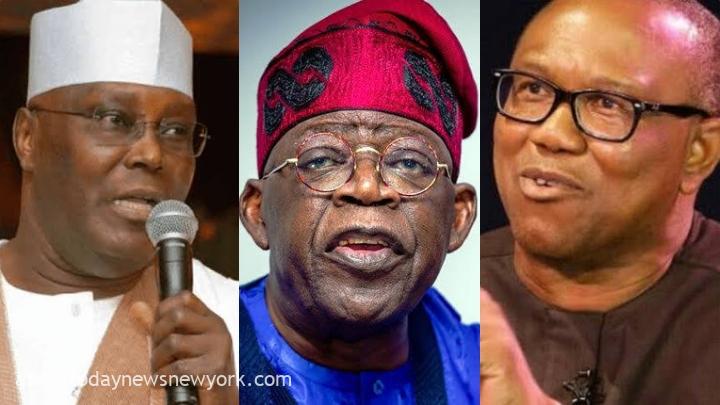Final legal fireworks will today (Monday) begin at the Supreme Court in the multiple appeals filed by the candidate of the Peoples Democratic Party (PDP), Alhaji Atiku Abubakar, his counterpart in the Labour Party (LP). Mr. Peter Obi and the Allied Peoples Movement (APM) which is seeking President Bola Tinubu sack as Nigeria’s leader.
Africa Today News, New York reports that the appellants in their separate appeals are praying the apex court to set aside the judgment of the Presidential Election Petition Court (PEPC), which affirmed Tinubu of the ruling All Progressives Congress, APC, as the valid winner of the presidential election that held on the 25th of February.
Atiku appealed Tinubu’s victory on 35 grounds through his legal team, led by Chief Chris Uche, while Obi appealed Tinubu’s victory on 51 grounds by his own legal team, led by Dr. Livy Uzoukwu.
The APM, on the other hand, asked the Supreme Court to overturn the declaration and reappointment of Tinubu and Kashim Shettima as President and Vice President, respectively. The APM, lead by its attorney Chukwuma-Machukwu, submitted ten grounds for appeal, which were condensed into three key points.
In all of these, president Tinubu, his All Progressives Congress(APC) and the Independent National Electoral Commission(INEC) have asked the Supreme Court to dismiss the appeals for lacking in merit.
Read Also: APC, Obi Clash Over Tinubu’s Certificates, Identity
President Tinubu further urged the court to reject an application that Atiku filed for permission to tender a copy of his certificate that was released by the Chicago State University in the USA.
As an addendum to his appeal, Atiku went further to file a motion to bring in fresh evidence against Tinubu relating to his academic records that were released to him by a United State Court.
Both Atiku who came second in the election and Obi who came third, are seeking to set aside the judgement of the Justice Haruna Tsammani-led five-member panel of the PEPC, which had on September 6, dismissed petitions they filed against Tinubu.
Specifically, Atiku, contended that the verdict of the PEPC was not only “against the weight of evidence” but occasioned a grave miscarriage of justice against him.
The former vice president insisted that the PEPC panel erred in law, when it failed to nullify the presidential election on the grounds of non-compliance with the Electoral Act, 2022, even when evidence showed that the Independent National Electoral Commission, INEC, acted in breach of extant laws and regulations guiding the conduct of elections.
He accused the PEPC of reaching its unanimous decision based on gross misconstruction and misrepresentation of provisions of both the 1999 Constitution, as amended, and the Electoral Act, 2022.
According to him, ‘The lower court erred in law when it refused to uphold the mandatoriness of electronic transmission of results for confirmation and verification of final results introduced by the Electoral Act 2022 for transparency and integrity of results in accordance with the principles of the Act.’
He argued among other issues, that section 64(4) & (5) of the Electoral Act, as well as INEC’s Regulations & Guidelines for the conduct of the election, which he tendered in evidence, made mandatory, the use of the Bimodal Voter Accreditation System, BVAS, machines for electronic transmission of results of the election directly from the polling units to INEC’s collation system for the verification, confirmation and collation of results before the announcement.
In his appeal, Obi argued that the PEPC panel erred in law and thereby reached a wrong conclusion when it dismissed his petition.
He alleged that the panel wrongly evaluated the proof of evidence he adduced before it and occasioned a grave miscarriage of justice when it held that he did not specify polling units where irregularities occurred during the election.
Obi and the LP further faulted the PEPC for dismissing their case on the premise that they did not specify the figures of votes or scores that were allegedly suppressed or inflated in favour of President Tinubu and the APC.
They equally accused the Justice Tsammani-led panel of erring in law when it relied on paragraphs 4(1) (d) (2) and 54 of the First Schedule to the Electoral Act 2022 to strike out paragraphs of the petition.
While accusing the lower court of breaching his right to a fair hearing, Obi, insisted that evidence of his witnesses were wrongly dismissed as incompetent.
He told the apex court that the panel unjustly dismissed his allegation that INEC uploaded 18, 088 blurred results on its IReV portal.
Obi insisted that the PEPC overlooked evidence that established that President Tinubu was previously indicted and fined the sum of $460, 000 in the USA over his involvement in a drug-related case.
On its own part, the APM’s appeal faulted the September 6 judgment of the PEPC dismissing its petition for lack of locus standi by contending that the PEPC failed to painstakingly to consider the provisions of sections 130, 137, 139, 142 and 239 of the 1999 Constitution as well as sections 29, 31, 33 and 34 of the Electoral Act, 2022, as they apply to its quest for the validity or otherwise of the said election of Tinubu and Shettima as president and vice president.
It argued that by holding that its petition is a pre-election matter, the PEPC erred in law when it misinterpreted section 142 (1) of the 1999 constitution as a pre-election provision.

